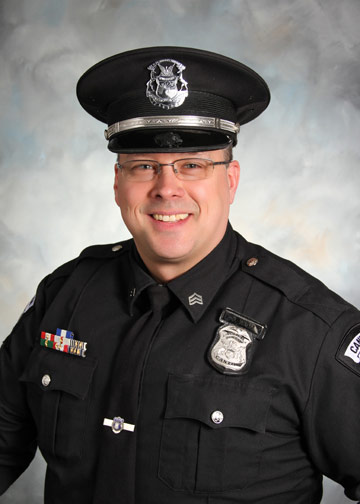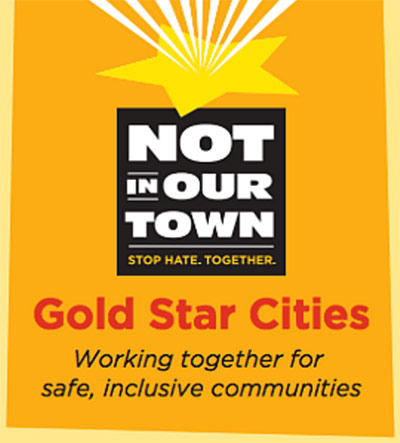Contact Us
To provide feedback on the Community Policing Dispatch, e-mail the editorial board at CPDispatch@usdoj.gov.
To obtain details on COPS Office programs, publications, and resources, contact the COPS Office Response Center at 800-421-6770 or AskCopsRC@usdoj.gov

U.S. Department of Justice
Office of Community Oriented Policing Services
Washington, DC 20530
 Sergeant Dale Waltz of the Canton Police Department talks about the importance of introducing Not In Our Town and its model of creating safe and inclusive communities for all the people of Canton, Michigan. Not In Our Town and the COPS Office have joined together in the Safe and Inclusive Communities Initiative, a partnership formed to bring tools and resources to communities that foster collaboration between the people and their police agencies.
Sergeant Dale Waltz of the Canton Police Department talks about the importance of introducing Not In Our Town and its model of creating safe and inclusive communities for all the people of Canton, Michigan. Not In Our Town and the COPS Office have joined together in the Safe and Inclusive Communities Initiative, a partnership formed to bring tools and resources to communities that foster collaboration between the people and their police agencies.
Tell us about your command leadership training and the project you developed during that training.
Canton is very good at developing its officers and its command staff for future endeavors and future command and leadership positions in its department. They send all recently promoted command officers or sergeants to what is called Staff and Command School and I happened to attend one at Michigan State University. One of the final requirements that we all knew we had to do was to write a 20 page paper and do a 15 minute presentation on anything law enforcement related that we wanted to do. That started or began my interest in my final project.
What did you eventually land on as a topic for your paper and presentation in your Staff and Command School?
 Ultimately, my goal was to bring the Not In Our Town model to the Canton community, and my second goal was to become the first Gold Star Cities community in Michigan. I sought those goals based on my experience as the Cultural Diversity Instructor with the Canton Police Department since 2003, and as the co-chair of the Canton Response to Hate Crimes Coalition. My co-chair of the coalition was Eva Davis from the Canton Public Library. Together, we looked at this as an opportunity, since we have such low reported incidents of hate crime in Canton. We wanted to do something that would get us out into the community more, involve more people and broaden the exposure of the coalition. I looked at this as a great opportunity to bring this to the community as a proactive approach. I also saw this as unique in that the police department would bring this to the community, rather than the community approaching the police department and saying, “Hey, would you like to join us in this endeavor?”
Ultimately, my goal was to bring the Not In Our Town model to the Canton community, and my second goal was to become the first Gold Star Cities community in Michigan. I sought those goals based on my experience as the Cultural Diversity Instructor with the Canton Police Department since 2003, and as the co-chair of the Canton Response to Hate Crimes Coalition. My co-chair of the coalition was Eva Davis from the Canton Public Library. Together, we looked at this as an opportunity, since we have such low reported incidents of hate crime in Canton. We wanted to do something that would get us out into the community more, involve more people and broaden the exposure of the coalition. I looked at this as a great opportunity to bring this to the community as a proactive approach. I also saw this as unique in that the police department would bring this to the community, rather than the community approaching the police department and saying, “Hey, would you like to join us in this endeavor?”
So ultimately, you wanted to expand the scope and reach of the Hate Crimes Coalition and you saw this (NIOT/Gold Star Cities) as a good way to do that?
We are such a diverse community that I wanted everyone in the community to know that their police department is proactive, that we include everyone and that we view this as a partnership with our community to reduce crime and enhance the quality of life for our citizens. We wanted to bring this to the community and make sure that they understand that we are a different department - we are very transparent and it’s very important for us to work with our community. That was another goal and reason to bring this to the community.
What were the obstacles that you had to think through as you were introducing the project? How did you overcome them?
I had to make sure that all levels of my administration were aware of my endeavor, my goals and what I want to do for my project. I want this to be something that I can put stakes down in the community with Not In Our Town and make sure that I get buy-in. The obstacles, I guess, were just the unknown. I knew that I had a very supportive Director of Public Safety, but he had to present it to the Township Supervisor, who then had to present it to the elected officials, so things were kind of reverberating out from there. I did present it to our Hate Crimes Coalition and they were very enthusiastic about it, so I didn’t view that as much of an obstacle. But it was really about getting all of the buy-in from the government officials and really presenting it to the community. The other obstacle that I faced was that I knew that I wanted a rally. We can put down on paper that we want to be a Not In Our Town community or that these are the things we stand for, but I wanted an outward show of the Not In Our Town model.
But you saw that as an important aspect of Not In Our Town, to have this rally, this outward showing of a unity rally between the community and the department?
I wanted an outward showing to the community of what the police department will bring and what our Hate Crimes Coalition is all about. I wanted everyone to know that we find strength in the diversity of our community, and to let everyone know to come out and meet their police department, meet each other and know that we follow and are big supporters of the Not In Our Town model and the organization.
How did you secure buy-in from diverse community members? From your department?
To get buy-in from my department, it was basically explaining it to the officers at the shift level, as a group at roll call and also some one-on-one conversations. Often, cops don’t always like change and I wanted to make sure that they understood that there really wasn’t going to be any change here. What’s great about the Canton Police Department is that a lot of the things that Not In Our Town stands for and advocates for police departments, we already do. It wasn’t really a tough sell because it was, “Okay guys, this is what Not In Our Town is all about, this is how we’re going to bring them into the community, here’s how it’s going to affect you and how it’s not really going to affect you, but here’s all the positives that can come out of it.” And from a law enforcement officer’s perspective, one of the big things that I had to let them know is, this is a community policing organization so this is another tool for community policing. Ultimately, this will help build bridges, will help form bonds with the community and that can only make the community safer, it makes you as an officer safer, it can reduce our crime, it can build trust.
And buy in from your city?
Once I went to my Director of Public Safety, he then went through the Township Supervisor and things went on from there. And when I wanted to hold the rally, I wanted to make sure to invite all of the political folks important to Canton. But once they found out what this was all about, it was pretty easy as well for them to accept it and say this is something that is really great. In fact, one of our representatives from Canton, Christie Pagan, got the Governor of Michigan to support it. So, the Governor of Michigan had a declaration that said: “I, as the Governor, support this endeavor in Canton for Not In Our Town.” It was a pretty cool thing.
Interview has been edited for style and clarity.
Read next month’s Community Policing Dispatch for the rest of the interview.
Subscribe to Email Updates
To sign up for monthly updates or to access your subscriber preferences, please enter your email address in the Subscribe box.






